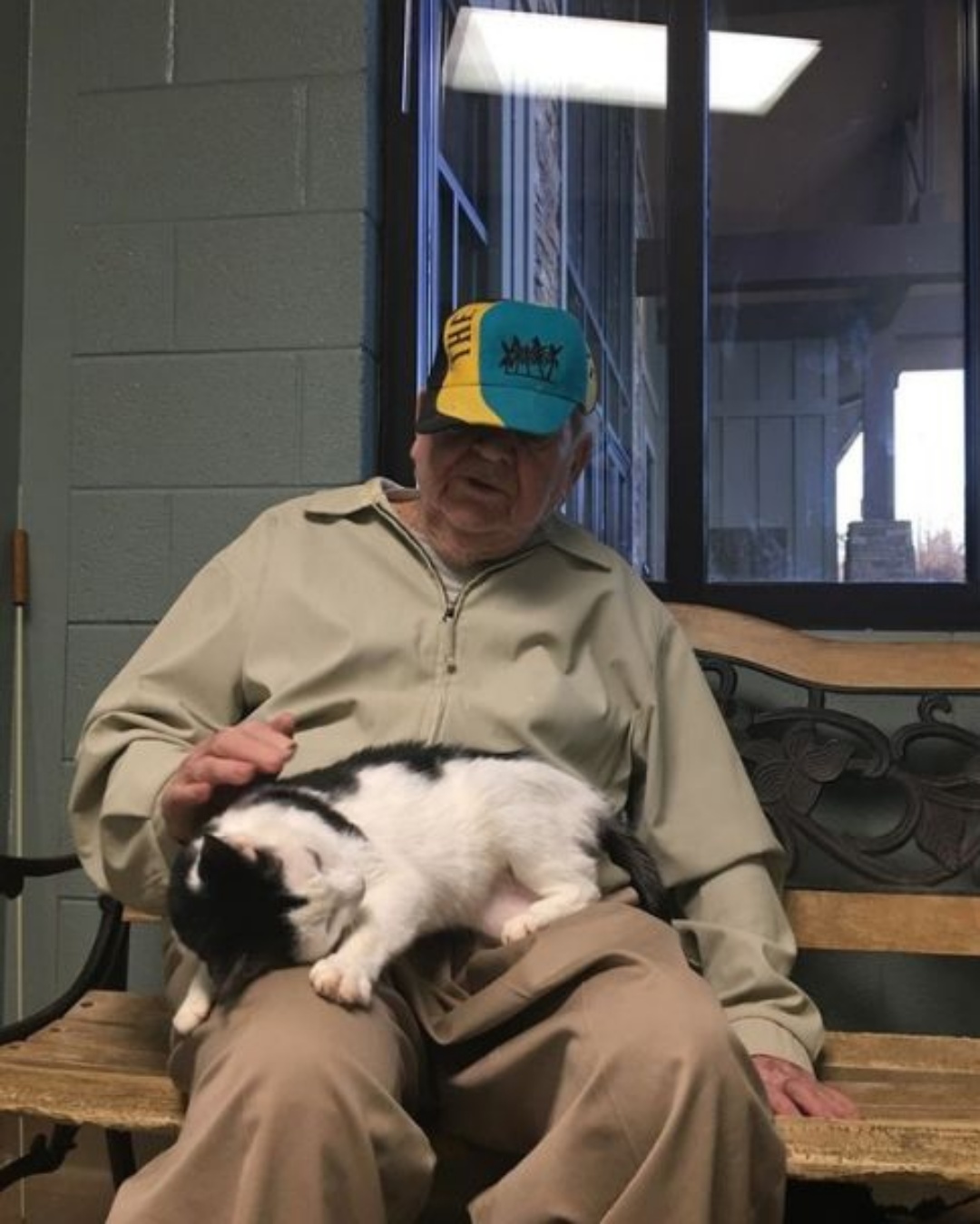Whiskers had lived at the nursing home for as long as anyone could remember.
He wasn’t really owned by anyone. He wasn’t exactly a pet, either. He just… belonged there — a small, black-and-white cat who wandered the halls with the quiet authority of someone who had earned his place.
The residents adored him, or at least tried to.
He was charming in his own grumpy way — aloof with most, affectionate with few, and impossible to predict. He’d weave between wheelchairs one day and vanish for hours the next, sleeping in sunlit corners or watching the world through the glass doors at the front entrance.
But there was one man he never avoided.
Mr. Delano.
He was one of the quieter residents — thin, gentle, with a voice like rustling paper. His eyes held a softness that came from decades of living and losing. He didn’t talk much about his past, though sometimes, when the nurses changed his linens or brought his meals, he’d murmur something about “the farm” and “my boy.”
The first time Whiskers jumped into his lap, we all noticed.
It was morning, and Mr. Delano had been sitting by the window, staring at the trees swaying outside. Whiskers padded in, tail flicking, and without hesitation leapt up onto his knees.
There was no coaxing, no treats, no gentle words.
Just quiet recognition.
Mr. Delano chuckled softly, his thin hands trembling as they moved through the cat’s fur. “Well, would you look at that,” he said. “Took you long enough to find me, didn’t it?”
We laughed.
But Whiskers didn’t move.
From that day on, he belonged to Mr. Delano — or maybe it was the other way around.
Every morning, without fail, Whiskers would appear at his door just after breakfast. He’d wait patiently until someone opened it, then trot in like clockwork and leap onto the same lap.
Together they would sit — sometimes for minutes, sometimes for hours.
No words. Just warmth.
The steady rhythm of purring filling the quiet room.
The nurses would tease, saying, “Whiskers found his favorite human.”
Mr. Delano would smile and reply, “No. I think he just remembered me.”
We didn’t understand what he meant. Not then.
Weeks turned into months.
Mr. Delano’s health began to fade.
He spoke less, slept more, and one evening, just after sunset, he passed peacefully in his bed — Whiskers curled beside him, his head resting on the old man’s hand.
When we found them, the sight made us all pause.
It looked as if Whiskers knew.
As if he’d been waiting for something — or someone — all along.
The next morning, we expected the cat to return to his usual spots. Maybe the window. Maybe the kitchen where the staff sometimes slipped him scraps. But he didn’t.
He stayed.
Curled tightly on the empty bed, eyes half-closed, paws tucked beneath his chest. He didn’t eat. Didn’t move. Just stayed there — silent, still, loyal.
We tried coaxing him out, even bringing him food. He ignored it all.
There was something sacred about his stillness.
That evening, as we began packing Mr. Delano’s belongings, one of the nurses opened the nightstand drawer.
“Look at this,” she whispered.
Inside was a faded photograph — edges frayed, colors yellowed with time.
It showed a young man standing in a field, sunlight spilling over his shoulders. In his arms, a black-and-white kitten with a white blaze across its face — identical to Whiskers.
On the back of the photo, in shaky handwriting, were four simple words:
“My boy, always waiting.”
For a moment, no one spoke.
We looked from the photo to the cat still lying on the bed. The resemblance was undeniable. The same markings, the same eyes.
It seemed impossible — the kind of thing you only hear about in stories. But deep down, none of us doubted.
Maybe Whiskers hadn’t wandered into our nursing home by accident.
Maybe he had been waiting — just as the note said.
Waiting for his boy to come home.
That night, something changed.
As if the message had been delivered, Whiskers finally stirred. He stood, stretched slowly, then walked to the door.
He paused for a moment, glancing back at the bed — at the space where Mr. Delano had spent his final hours. Then, without a sound, he padded quietly down the hallway and disappeared into the night.
We searched for him the next day. And the next.
But Whiskers never returned.
Some said he’d gone to find another home. Others believed he’d simply finished his task — that he had waited long enough.
Every now and then, someone swears they see a black-and-white cat sitting by the edge of the woods behind the nursing home. Watching. Listening. Waiting.
And maybe, just maybe, that’s true.
Because love like that doesn’t end — not really. It lingers in quiet corners, in gentle habits, in the spaces where memory meets faith.
Perhaps Whiskers wasn’t just a stray.
Perhaps he was love returned — the kind that finds its way back across years, across lifetimes, to say one final goodbye.
When I think of Mr. Delano now, I don’t remember the hospital bed or the frailty of his last days.
I remember him smiling softly, whispering to the cat in his lap:
“Took you long enough to find me, didn’t it?”
And somehow, I think Whiskers always knew the way home. 🐾
